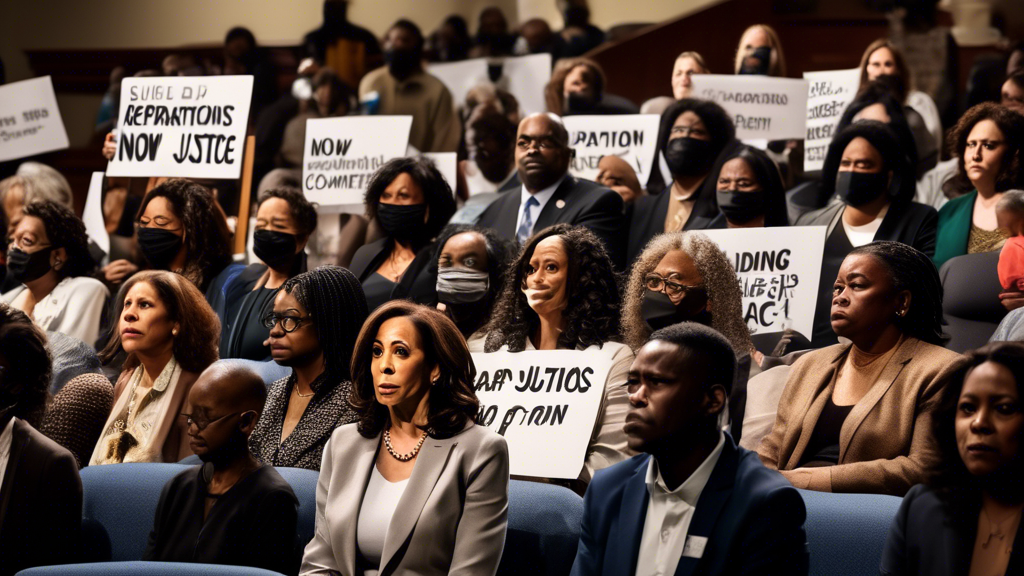
Harris Remains Quiet on Democrats Funding Reparations
As the presidential campaign progresses, Kamala Harris, once a promising contender within the Democratic Party, is increasingly drawing criticism for her silence on significant issues, including the contentious topic of reparations. This criticism extends to how she and her party are engaging with voters, suggesting a broader strategy that prioritizes electoral manipulation over genuine public discourse.
Democratic Party Strategy
The Democratic Party has undergone a noticeable shift in strategy, as observed in recent analyses. Instead of focusing on persuading voters to back their candidates through traditional campaigning, the party appears to be gravitating towards manipulating the electoral machinery in critical states. This approach is posited as a means to secure victories without needing to rely on the inherent appeal or capability of their candidates. Critics argue that this method undermines the democratic process and erodes trust in electoral integrity.
Kamala Harris’s Campaign
Harris’s presidential campaign has increasingly been viewed as emblematic of this new strategy. Detractors contend that rather than engaging directly with voters, Harris opts for a more scripted approach, characterized by rehearsed speeches and a reluctance to participate in extensive interviews. This behavior raises questions about her commitment to voter engagement and her ability to relate authentically to the electorate.
Media and Information Control
The corporate media landscape has also drawn scrutiny for its role in this unfolding narrative. Outlets like MSNBC are accused of providing favorable coverage of Harris, despite her scarce public engagements and reticence to delve into substantive policy discussions, particularly around issues like reparations. Furthermore, there are concerning calls within the Democratic circles to regulate social media platforms, ostensibly to curb misinformation. Critics of this approach highlight the potential dangers of constraining free speech in the quest to control public discourse.
Criticism of Harris’s Competence
Questions surrounding Harris’s competence continue to mount, with some suggesting that her inability to effectively engage with the issues may hinder her campaign. Observers posit that her focus seems more aligned with the pursuit of political power rather than exhibiting genuine leadership or policy expertise. This perception of her candidacy has implications not only for her campaign but for the party’s broader electoral strategy.
Comparison with Previous Elections
The current political landscape and the methods employed in Harris’s campaign echo tactics used during the 2020 election. Similar approaches were perceived during the electoral processes in Pennsylvania and Arizona in 2022, where the Democratic Party employed strategic maneuvers to fortify their positions. The effectiveness of these maneuvers raises critical questions about their long-term implications for American democracy and the health of electoral engagement.
Authoritarian and Conspiracy Theories
The narrative around the Democratic strategy is further complicated by various conspiracy theories, particularly regarding foreign influence in the electoral process via social media. Detractors of figures like Robert Reich, who advocate for stricter regulations on platforms like X (formerly Twitter), argue that such calls contribute to an atmosphere of mistrust. They contend that these measures could stifle open political discourse under the guise of preventing foreign interference.
Conclusion
As the campaign continues, the silence surrounding Kamala Harris’s stance on pressing issues like reparations, paired with the Democratic Party’s evolving strategies, raises significant questions about the future of voter engagement and the integrity of the electoral process. Critics assert that the current approach of prioritizing control over genuine dialogue may ultimately prove detrimental to the party and the country as a whole. As Harris navigates the complexities of her campaign, observers await not only her policy positions but also her willingness to engage in meaningful discourse with the electorate.
